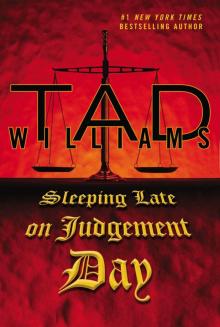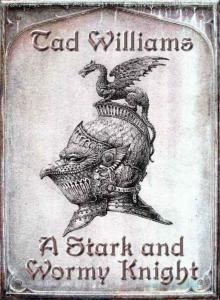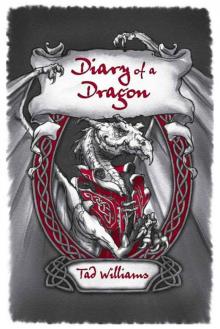- Home
- Tad Williams
The Dragonbone Chair
The Dragonbone Chair Read online
THE DRAGONBONE
CHAIR
Tad Williams
♠
This book is dedicated to my mother, Barbara Jean Evans, who taught to me a deep affection for Toad Hall, the Hundred Aker Woods, the Shire, and many other hidden places and countries beyond the fields we know. She also induced in me a lifelong desire to make my own discoveries, and to share them with others. I wish to share this book with her.
Table of Contents
Authors Note
Author’s Warning
Foreword
PART ONE Simon Mooncalf
1 The Grasshopper and the King
2 A Two-Frog Story
3 Birds in the Chapel
4 Cricket Cage
5 The Tower Window
6 The Cairn on the Cliffs
7 The Conqueror Star
8 Bitter Air and Sweet
9 Smoke on the Wind
10 King Hemlock
11 An Unexpected Guest
12 Six Silver Sparrows
13 Between Worlds
14 The Hill Fire
PART TWO Simon Pilgrim
15 A Meeting at the Inn
16 The White Arrow
17 Binabik
18 A Net of Stars
19 The Blood of Saint Hoderund
20 The Shadow of the Wheel
21 Cold Comforts
22 A Wind from the North
23 Back into the Heart
24 The Hounds of Erkynland
25 The Secret Lake
26 In the House of Geloë
27 The Gossamer Towers
28 Drums of Ice
29 Hunters and Hunted
PART THREE Simon Snowlock
30 A Thousand Nails
31 The Councils of the Prince
32 Northern Tidings
33 From the Ashes of Asu’a
34 Forgotten Swords
35 The Raven and the Cauldron
36 Fresh Wounds and Old Scars
37 Jiriki’s Hunt
38 Songs of the Eldest
39 High King’s Hand
40 The Green Tent
41 Cold Fire and Grudging Stone
42 Beneath the Uduntree
43 The Harrowing
44 Blood and the Spinning World
Appendix
PEOPLE
PLACES
CREATURES
THINGS
A GUIDE TO PRONUNCIATION
WORDS AND PHRASES
Authors Note
“I have undertaken a labor, a labor out of love for the world and to comfort noble hearts: those that I hold dear, and the world to which my heart goes out. Not the common world do I mean, of those who (as I have heard) cannot bear grief and desire but to bathe in bliss. (May God then let them dwell in bliss!) Their world and manner of life my tale does not regard: its life and mine lie apart. Another world do I hold in mind, which bears together in one heart its bitter sweetness and its dear grief, its heart’s delight and its pain of longing, dear life and sorrowful death, dear death and sorrowful life. In this world let me have my world, to be damned with it, or to be saved.”
—Gottfried von Strassburg
(author of Tristan und Isolt)
This work would not have been possible without the help of many people. My thanks go out to: Eva Cumming, Nancy Deming-Williams, Arthur Ross Evans, Peter Stampfel, and Michael Whelan, who all read a dreadfully long manuscript, then offered support, useful advice, and clever suggestions; to Andrew Harris, for logistical support above and beyond the call of friendship; and especially to my editors, Betsy Wollheim and Sheila Gilbert, who worked long and hard to help me write the best book I could. They are great souls all.
Author’s Warning
Wanderers in the land of Osten Ard are cautioned not to put blind trust in old rules and forms, and to observe all rituals with a careful eye, for they often mask being with seeming.
The Qanuc-folk of the snow-mantled Trollfells have a proverb. “He who is certain he knows the ending of things when he is only beginning them is either extremely wise or extremely foolish; no matter which is true, he is certainly an unhappy man, for he has put a knife in the heart of wonder.”
More bluntly, new visitors to this land should take heed: Avoid Assumptions.
The Qanuc have another saying: “Welcome stranger. The paths are treacherous today.”
Foreword
“…The book of the mad priest Nisses is large, say those who have held it, and as heavy as a small child. It was discovered at Nisses’ side as he lay, dead and smiling, beside the tower window from which his master King Hjeldin had leaped to his own death moments before.
The rusty brown ink, concocted of lambsfoil, hellebore, and rue—as well as some redder, thicker liquid—is dry, and flakes easily from the thin pages. The unadorned skin of a hairless animal, the species unprovable, forms the binding.
Those holy men of Nabban who read it after Nisses’ passing pronounced it heretical and dangerous, but for some reason did not burn it, as is usually done with such texts. Instead, it lay for many years in Mother Church’s near-endless archives, in the deepest, most secret vaults of the Sancellan Aedonitis. It has now apparently disappeared from the onyx casket which housed it; the never-gregarious Order of the Archives is vague as to its present whereabouts.
Some who have read Nisses’ heretical work claim that it contains all the secrets of Osten Ard, from this land’s murky past to the shadows of things unborn. The Aedonite priest-examiners will say only that its subject matter was ‘unholy.’
It may indeed be true that Nisses’ writings predict the what-will-be as clearly—and, we may presume, eccentrically—as they chronicle the what-has-been. It is not known, however, whether the great deeds of our age—especially, for our concern, the rise and triumph of Prester John—are included in the priest’s foretellings, although there are suggestions that this may be true. Much of Nisses’ writing is mysterious, its meaning hidden in strange rhymes and obscure references. I have never read the full work, and most of those who have are now long dead.
The book is titled, in the cold, harsh runes of Nisses’ northern birthplace, Du Svardenvyrd, which means The Weird of the Swords…”
–From The Life and Reign of King John Presbyter
by Morgenes Ercestres
PART ONE
Simon Mooncalf
1
The Grasshopper and the King
On this day of days there was an unfamiliar stirring deep inside the dozing heart of the Hayholt, in the castle’s bewildering warren of quiet passages and overgrown, ivy-choked courtyards, in the monk’s holes and damp, shadowed chambers. Courtiers and servants alike goggled and whispered. Scullions exchanged significant glances across the washing tubs in the steamy kitchen. Hushed conversations seemed to be taking place in every hallway and dooryard of the great keep It might have been the first day of spring, to judge from the air of breathless anticipation, but the great calendar in Doctor Morgenes’ cluttered chamber showed differently: the month was only Novander. Autumn was holding the door, and Winter was trudging in.
What made this a day different from all others was not a season but a place—the Hayholt’s throne room. For three long years its doors had been shut by the king’s order, and heavy draperies had cloaked the multicolored windows. Even the cleaning servants had not been permitted to cross the threshold, causing the Mistress of Chambermaids no end of personal anguish. Three summers and three winters it had stood undisturbed. Today it was no longer empty, and all the castle hummed with rumor.
In truth, there was one person in the busy Hayholt whose attention was not fixed on that long-untenanted room, one bee in the murmuring hive whose solitary song was not in key with the
greater droning. That one sat in the heart of the Hedge Garden, in an alcove between the dull red stone of the chapel and the leafless side of a skeletal hedge-lion, and thought he was not missed. It had been an irritating day so far—the women all busy, with scant time to answer questions; breakfast late, and cold into the bargain. Confusing orders had been given to him, as usual, and no one had any time to waste with any of his problems…
And that was also, he thought grumpily, quite predictable. If it hadn’t been for his discovery of this huge, magnificent beetle—which had come strolling across the garden, as self-satisfied as any prosperous villager—then the entire afternoon would have been a waste of time.
With a twig he widened the tiny road he had scraped in the dark, cold earth beside the wall, but still the captive would not walk forward. He tickled gently at its glossy carapace, but the stubborn beetle would not budge. Frowning, he sucked at his upper lip.
“Simon! Where in the name of holy Creation have you been!”
The twig dropped from his nerveless fingers, as though an arrow had pierced his heart. Slowly, he turned to look at the looming shape.
“Nowhere…” Simon began to say, but even as the words passed his lips a pair of bony fingers caught his ear and brought him sharply to his feet, yelping in pain.
“Don’t you dare ‘nowhere’ me, young layabout,” Rachel the Dragon, Mistress of Chambermaids, barked full into his face—a juxtaposition made possible only by Rachel’s tiptoed stance and the boy’s natural inclination to slouch, for the head chambermaid lacked nearly a foot of Simon’s height.
“Sorry, then, mistress, I’m sorry,” Simon muttered, noting with sadness the beetle nosing toward a crack in the chapel wall and freedom.
“ ‘Sorry’ is not going to get you by forever,” Rachel growled. “Every single body in the house is at work a-getting things ready but you! And, bad enough that is, but then I have to waste my valuable time trying to find you! How can you be such a wicked boy, Simon, when you should be acting like a man? How can you?”
The boy, fourteen gangly years old and furiously embarrassed, said nothing. Rachel stared at him.
Sad enough, she thought, that red hair and those spots, but when he squints his eyes all up that way and scowls—why, the child looks half-witted!
Simon, staring in turn at his captor, saw Rachel breathing heavily, pluming the Novander air with puffs of vapor. She was shivering, too, although whether from the cold or anger, Simon couldn’t tell. It didn’t really matter. It just made him feel worse.
She’s still waiting for an answer—how tired and cross she looks! He curled himself into an even more pronounced slump and glared at his own feet.
“Well, you’ll just come with me, then. The good Lord knows I’ve got things to keep an idle boy busy with. Don’t you know the king is up out of his sickbed? That he’s gone to his throne room today? Are you deaf and blind?” She grabbed his elbow and frog-marched him across the garden.
“The King? King John?” Simon asked, surprised.
“No, you ignorant boy. King Stone-in-the-Road! Of course King John!” Rachel halted in her tracks to push a wisp of limp steel-gray hair back under her bonnet. Her hand trembled. “There, I hope you’re happy,” she said. “You’ve gotten me so flummoxed and upset that I’ve gone and been disrespectful to the name of our good old King John. And him so sick and all.” She snuffled loudly and then leaned over to deal Simon a stinging slap on the-fat part of his arm. “Just you come.”
She stumped forward, wicked boy in tow.
Simon had never known any other home but the ageless castle called Hayholt, which meant High Keep. It was well named: Green Angel Tower, its loftiest point, soared far above even the eldest and tallest of trees. If the Angel herself, perched on the tower top, had dropped a stone from her verdigrised hand it would have plummeted nearly two hundred cubits before splashing into the brackish moat and troubling the sleep of the great pikefish bobbing close above the centuried mud.
The Hayholt was older by far than all the generations of Erkynlandish peasants who had been born, labored, and died in the fields and villages surrounding the great keep. The Erkynlanders were only the latest to claim the castle—many others had called it their own, but none had been able to make it wholly so. The outwall around the sprawling keep showed the work of diverse hands and times: the rough-hewn rock and timber of the Rimmersmen, the haphazard patching and strange carvings of the Hernystiri, even the meticulous stonework of Nabbanai craftsmen. But looming over all stood Green Angel Tower, erected by the undying Sithi long before men had come to these lands, when all of Osten Ard had been their dominion. The Sithi had been the first to build here, constructing their primeval stronghold on the headlands overlooking the Kynslagh and the river-road to the sea. They had called their castle Asu’a; if it had a true name, this house of many masters, then Asu’a was that name.
The Fair Folk had vanished now from the grassy plains and rolling hill country, fled mostly to the woods and craggy mountains and other dark places inconvenient to men. The bones of their castle—a home to usurpers—remained behind.
Asu’a the paradox; proud yet ramshackle, festive and forbidding, seemingly oblivious to changes of tenantry. Asu’a—the Hayholt. It bulked mountainously above the outlands and town, hunched over its fief like a sleeping, honey-muzzled bear among her cubs.
It often seemed that Simon was the only dweller in the great castle who had not settled into his place in life. The masons plastered the whitewashed facing of the residence and shored up the castle’s crumbling walls—although the crumbling did sometimes seem to outpace the restorations—with never a thought toward how the world spun or why. The pantlers and butlers, whistling merrily, rolled huge casks of sack and salted beef here and there. With the castle seneschal beside them, they haggled with farmers over the whiskery onions and soil-moist carrots brought in sacks to the Hayholt’s kitchen every morning. And Rachel and her chambermaids were always excruciatingly busy, flourishing their brooms of bound straw, chasing dust balls as if herding skittish sheep, muttering pious imprecations about the way some people left a chamber when they departed, and generally terrorizing the slothful and slovenly.
In the midst of such industry, gawky Simon was the fabled grasshopper in the nest of ants. He knew he would never amount to much: many people had told him so, and nearly all of them were older—and presumably wiser—than he. At an age when other boys were clamoring for the responsibilities of manhood, Simon was still a muddier and a meanderer. No matter what task he was given to do, his attention soon wandered, and he would be dreaming of battles, and giants, and sea voyages on tall, shining ships…and somehow, things would get broken, or lost, or done wrong.
Other times he could not be found at all. He skulked around the castle like a scrawny shadow, could shinny up a wall as well as the roof-masons and glaziers, and knew so many passageways and hiding holes that the castle folk called him “ghost boy.” Rachel boxed his ears frequently, and called him a mooncalf.
Rachel had finally let go of his arm, and Simon dragged his feet glumly as he followed the Mistress of Chambermaids like a stick caught in a skirt hem. He had been discovered, his beetle had escaped, and the afternoon was ruined.
“What must I do, Rachel,” he mumbled unpleasantly, “help in the kitchen?”
Rachel snorted disdainfully and waddled on, a badger in an apron. Simon looked back regretfully on the sheltering trees and hedges of the garden. Their commingled footfalls resounded solemnly down the long stone hallway.
He had been raised by the chambermaids, but since he was certainly never going to be one himself—his boy-ness aside, Simon was obviously not to be trusted with delicate domestic operations—a concerted effort had been made to find suitable labors for him. In a great house, and the Hayholt was doubtless the greatest, there was no place for those who did not work. He found employment of a sort in the castle kitchens, but even at this undemanding job he was not completely successful. The other s
cullions would laugh and nudge each other to see Simon—elbow-deep in hot water, eyes squinted shut in oblivious reverie—learning the trick of bird flight, or saving dream-maidens from imaginary beasts as his scrubbing stick floated off across the washing vat.
Legend had it that Sir Fluiren—a relative of the famous Sir Camaris of Nabban—had in his youth come to the Hayholt to be a knight, and had worked a year in disguise in this same scullery, due to his ineffable humility. The kitchen workers had teased him—or so the story went—calling him “Pretty-hands” because the terrible toil did not diminish the fine whiteness of his fingers.
Simon had only to look at his own cracked-nail, pink-boiled paws to know that he was no great lord’s orphan son. He was a scullion and a corner sweeper, and that was that. At a not much greater age, everyone knew, King John had slain the Red Dragon. Simon wrestled with brooms and pots. Not that it made much difference: it was a different, quieter world than in John’s youth, thanks largely to the old king himself. No dragons—living ones, anyway—inhabited the dark, endless halls of the Hayholt. But Rachel—as Simon often cursed to himself—with her sour face and terrible, tweezing fingers, was near enough.
They reached the antechamber before the throne room, the center of the inordinate activity. The chambermaids, moving at a near-run, careened from wall to wall like flies in a bottle. Rachel stood with fists set on hips and surveyed her domain—seeming, from the smile that tightened her thin mouth, to find it good.
Simon lurked against a tapestried wall, forgotten for a moment. Slouching, he stared from the corner of his eyes at the new girl Hepzibah, who was plump and curly-haired and walked with an insolent sway. Passing by with a sloshing bucket of water she caught his glance and smiled widely, amused. Simon felt fire crackling up his neck into his cheeks and turned to pick at the tattered wall hanging.

 God Rest Ye Merry, Gentlepig
God Rest Ye Merry, Gentlepig Tailchaser's Song
Tailchaser's Song Sleeping Late on Judgement Day
Sleeping Late on Judgement Day Stone of Farewell
Stone of Farewell The Dragonbone Chair
The Dragonbone Chair Sea of Silver Light
Sea of Silver Light A Stark and Wormy Knight
A Stark and Wormy Knight The Heart of What Was Lost
The Heart of What Was Lost Diary of a Dragon
Diary of a Dragon Last King of Osten Ard 02 - Empire of Grass
Last King of Osten Ard 02 - Empire of Grass To Green Angel Tower, Volume 1
To Green Angel Tower, Volume 1 The Dirty Streets of Heaven
The Dirty Streets of Heaven River of Blue Fire
River of Blue Fire The Very Best of Tad Williams
The Very Best of Tad Williams Mountain of Black Glass
Mountain of Black Glass Empire of Grass
Empire of Grass City of Golden Shadow
City of Golden Shadow Happy Hour in Hell
Happy Hour in Hell Shadowrise
Shadowrise Shadowmarch
Shadowmarch Brothers of the Wind
Brothers of the Wind Shadowheart
Shadowheart Bobby Dollar 02 - Happy Hour In Hell
Bobby Dollar 02 - Happy Hour In Hell The War of the Flowers
The War of the Flowers The Dirty Streets of Heaven bd-1
The Dirty Streets of Heaven bd-1 Tad Williams - The War of the Flowers (retail) (pdf)
Tad Williams - The War of the Flowers (retail) (pdf) Shadowheart s-4
Shadowheart s-4 Shadowrise s-3
Shadowrise s-3 The Dirty Streets of Heaven: Volume One of Bobby Dollar
The Dirty Streets of Heaven: Volume One of Bobby Dollar The Stone of Farewell
The Stone of Farewell (Shadowmarch #1) Shadowmarch
(Shadowmarch #1) Shadowmarch The Secrets of Ordinary Farm of-2
The Secrets of Ordinary Farm of-2 Shadowmarch s-1
Shadowmarch s-1![Bobby Dollar [04] God Rest Ye Merry, Gentlepig Read online](http://i1.bookreadfree.com/i1/04/06/bobby_dollar_04_god_rest_ye_merry_gentlepig_preview.jpg) Bobby Dollar [04] God Rest Ye Merry, Gentlepig
Bobby Dollar [04] God Rest Ye Merry, Gentlepig Lightspeed Issue 33
Lightspeed Issue 33 Sea of Silver Light o-4
Sea of Silver Light o-4 The Dragons of Ordinary Farm of-1
The Dragons of Ordinary Farm of-1 Shadowplay s-2
Shadowplay s-2 (Shadowmarch #2) Shadowplay
(Shadowmarch #2) Shadowplay